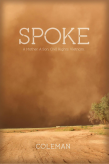“In courtrooms around the country Clark defended antiwar activists. In the court of public opinion, he charged the United States with militarism and arrogance, starting with the Vietnam War and continuing with Grenada, Libya, Panama and the Gulf War.”
– Washington Post, April 11, 2021
Thank you Ramsey Clark.
The following is an excerpt from my book, SPOKE:
"The first time out of my cell was ten days after I arrived there. I still had no idea what going on. I figured there must be some hiccup in my transit, and I was just parked in Harrisburg until it was sorted out. Then one morning a guard opened my cell door and told me I had visitors. Great, I thought. Maybe it’s Sue. Maybe she’s found out what’s going on. But it wasn’t Sue. It was a tall thin man with an angular face, wearing a thin tie, a brown suit and cowboy boots. It was Ramsey Clark.
Ramsey Clark had been LBJ’s Attorney General. He had succeeded Bobby Kennedy after Kennedy resigned to run for President. And Clark wasn’t alone. There were two other lawyers with him. Leonard Boudin, a pretty prominent Massachusetts civil rights lawyer I knew about but had never met before, and another lawyer, from Harrisburg -a younger guy named Tom Menaker.
They offered to represent me. “For what?” I asked. They said “Hasn’t anyone told you why you’re here?” And I said “No, I figured I was just in transit”. So they filled me in. They told me about Mitchell and Kleindienst and Armstrong and about Armstrong’s grand juries, and that one of the grand juries was convened in Harrisburg and it was looking into the alleged conspiracy to kidnap Henry Kissinger.
I was numb. It was like a ton of bricks had fallen on me and I couldn’t move or speak. They said I’d be taken to the grand jury room on the following day and asked questions. They told me everyone so far had been pretty much asked the same three or four questions with a few variations. All of the questions were vague. They said the grand jury at best was on a fishing expedition, trying to find evidence to justify the indictment they had already charged six people with. They said one question the prosecutor would ask me would be if I had ever been to an anti-war meeting, and if so, when and where and who was there and what was said by whom. The question was ridiculous, of course, since it described pretty much the previous three years of my life. They said they couldn’t tell me how to answer, but if I wanted I could refuse to answer the questions. That seemed reasonable to me. They said they were volunteering their services because they were so outraged at what was going on. They said not to worry.
I did worry, but given what eventually happened, I should have worried more."
– Washington Post, April 11, 2021
Thank you Ramsey Clark.
The following is an excerpt from my book, SPOKE:
"The first time out of my cell was ten days after I arrived there. I still had no idea what going on. I figured there must be some hiccup in my transit, and I was just parked in Harrisburg until it was sorted out. Then one morning a guard opened my cell door and told me I had visitors. Great, I thought. Maybe it’s Sue. Maybe she’s found out what’s going on. But it wasn’t Sue. It was a tall thin man with an angular face, wearing a thin tie, a brown suit and cowboy boots. It was Ramsey Clark.
Ramsey Clark had been LBJ’s Attorney General. He had succeeded Bobby Kennedy after Kennedy resigned to run for President. And Clark wasn’t alone. There were two other lawyers with him. Leonard Boudin, a pretty prominent Massachusetts civil rights lawyer I knew about but had never met before, and another lawyer, from Harrisburg -a younger guy named Tom Menaker.
They offered to represent me. “For what?” I asked. They said “Hasn’t anyone told you why you’re here?” And I said “No, I figured I was just in transit”. So they filled me in. They told me about Mitchell and Kleindienst and Armstrong and about Armstrong’s grand juries, and that one of the grand juries was convened in Harrisburg and it was looking into the alleged conspiracy to kidnap Henry Kissinger.
I was numb. It was like a ton of bricks had fallen on me and I couldn’t move or speak. They said I’d be taken to the grand jury room on the following day and asked questions. They told me everyone so far had been pretty much asked the same three or four questions with a few variations. All of the questions were vague. They said the grand jury at best was on a fishing expedition, trying to find evidence to justify the indictment they had already charged six people with. They said one question the prosecutor would ask me would be if I had ever been to an anti-war meeting, and if so, when and where and who was there and what was said by whom. The question was ridiculous, of course, since it described pretty much the previous three years of my life. They said they couldn’t tell me how to answer, but if I wanted I could refuse to answer the questions. That seemed reasonable to me. They said they were volunteering their services because they were so outraged at what was going on. They said not to worry.
I did worry, but given what eventually happened, I should have worried more."

 RSS Feed
RSS Feed